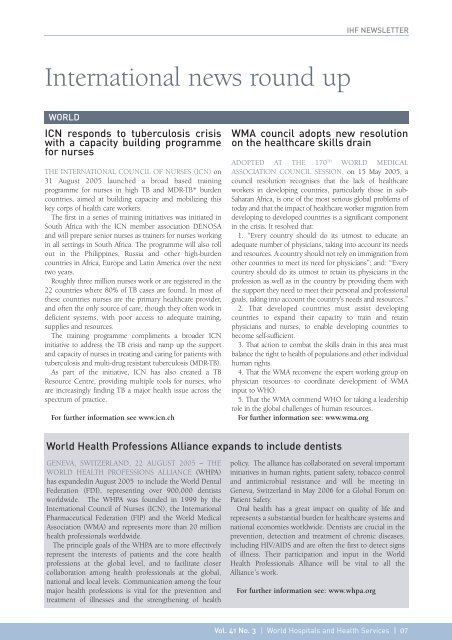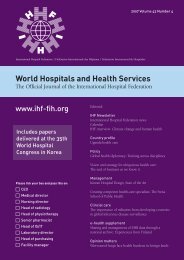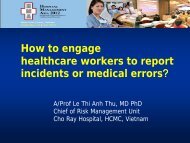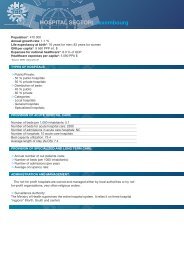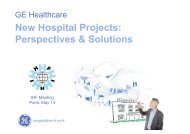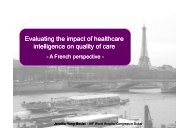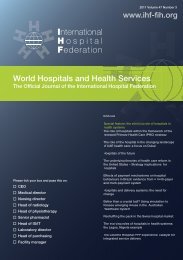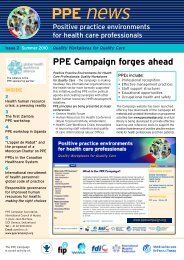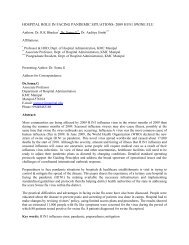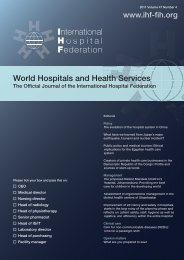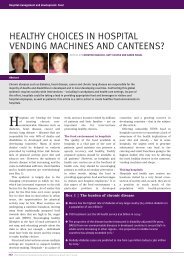World Hospitals and Health Services - International Hospital ...
World Hospitals and Health Services - International Hospital ...
World Hospitals and Health Services - International Hospital ...
Create successful ePaper yourself
Turn your PDF publications into a flip-book with our unique Google optimized e-Paper software.
IHF NEWSLETTER<br />
<strong>International</strong> news round up<br />
WORLD<br />
ICN responds to tuberculosis crisis<br />
with a capacity building programme<br />
for nurses<br />
THE INTERNATIONAL COUNCIL OF NURSES (ICN) on<br />
31 August 2005 launched a broad based training<br />
programme for nurses in high TB <strong>and</strong> MDR-TB* burden<br />
countries, aimed at building capacity <strong>and</strong> mobilizing this<br />
key corps of health care workers.<br />
The first in a series of training initiatives was initiated in<br />
South Africa with the ICN member association DENOSA<br />
<strong>and</strong> will prepare senior nurses as trainers for nurses working<br />
in all settings in South Africa. The programme will also roll<br />
out in the Philippines, Russia <strong>and</strong> other high-burden<br />
countries in Africa, Europe <strong>and</strong> Latin America over the next<br />
two years.<br />
Roughly three million nurses work or are registered in the<br />
22 countries where 80% of TB cases are found. In most of<br />
these countries nurses are the primary healthcare provider,<br />
<strong>and</strong> often the only source of care, though they often work in<br />
deficient systems, with poor access to adequate training,<br />
supplies <strong>and</strong> resources.<br />
The training programme compliments a broader ICN<br />
initiative to address the TB crisis <strong>and</strong> ramp up the support<br />
<strong>and</strong> capacity of nurses in treating <strong>and</strong> caring for patients with<br />
tuberculosis <strong>and</strong> multi-drug resistant tuberculosis (MDR-TB).<br />
As part of the initiative, ICN has also created a TB<br />
Resource Centre, providing multiple tools for nurses, who<br />
are increasingly finding TB a major health issue across the<br />
spectrum of practice.<br />
For further information see www.icn.ch<br />
WMA council adopts new resolution<br />
on the healthcare skills drain<br />
ADOPTED AT THE 170 TH WORLD MEDICAL<br />
ASSOCIATION COUNCIL SESSION, on 15 May 2005, a<br />
council resolution recognises that the lack of healthcare<br />
workers in developing countries, particularly those in sub-<br />
Saharan Africa, is one of the most serious global problems of<br />
today <strong>and</strong> that the impact of healthcare worker migration from<br />
developing to developed countries is a significant component<br />
in the crisis. It resolved that:<br />
1. “Every country should do its utmost to educate an<br />
adequate number of physicians, taking into account its needs<br />
<strong>and</strong> resources. A country should not rely on immigration from<br />
other countries to meet its need for physicians”; <strong>and</strong>: “Every<br />
country should do its utmost to retain its physicians in the<br />
profession as well as in the country by providing them with<br />
the support they need to meet their personal <strong>and</strong> professional<br />
goals, taking into account the country's needs <strong>and</strong> resources.”<br />
2. That developed countries must assist developing<br />
countries to exp<strong>and</strong> their capacity to train <strong>and</strong> retain<br />
physicians <strong>and</strong> nurses, to enable developing countries to<br />
become self-sufficient.<br />
3. That action to combat the skills drain in this area must<br />
balance the right to health of populations <strong>and</strong> other individual<br />
human rights.<br />
4. That the WMA reconvene the expert working group on<br />
physician resources to coordinate development of WMA<br />
input to WHO.<br />
5. That the WMA commend WHO for taking a leadership<br />
role in the global challenges of human resources.<br />
For further information see: www.wma.org<br />
<strong>World</strong> <strong>Health</strong> Professions Alliance exp<strong>and</strong>s to include dentists<br />
GENEVA, SWITZERLAND, 22 AUGUST 2005 – THE<br />
WORLD HEALTH PROFESSIONS ALLIANCE (WHPA)<br />
has exp<strong>and</strong>edin August 2005 to include the <strong>World</strong> Dental<br />
Federation (FDI), representing over 900,000 dentists<br />
worldwide. The WHPA was founded in 1999 by the<br />
<strong>International</strong> Council of Nurses (ICN), the <strong>International</strong><br />
Pharmaceutical Federation (FIP) <strong>and</strong> the <strong>World</strong> Medical<br />
Association (WMA) <strong>and</strong> represents more than 20 million<br />
health professionals worldwide.<br />
The principle goals of the WHPA are to more effectively<br />
represent the interests of patients <strong>and</strong> the core health<br />
professions at the global level, <strong>and</strong> to facilitate closer<br />
collaboration among health professionals at the global,<br />
national <strong>and</strong> local levels. Communication among the four<br />
major health professions is vital for the prevention <strong>and</strong><br />
treatment of illnesses <strong>and</strong> the strengthening of health<br />
policy. The alliance has collaborated on several important<br />
initiatives in human rights, patient safety, tobacco control<br />
<strong>and</strong> antimicrobial resistance <strong>and</strong> will be meeting in<br />
Geneva, Switzerl<strong>and</strong> in May 2006 for a Global Forum on<br />
Patient Safety.<br />
Oral health has a great impact on quality of life <strong>and</strong><br />
represents a substantial burden for healthcare systems <strong>and</strong><br />
national economies worldwide. Dentists are crucial in the<br />
prevention, detection <strong>and</strong> treatment of chronic diseases,<br />
including HIV/AIDS <strong>and</strong> are often the first to detect signs<br />
of illness. Their participation <strong>and</strong> input in the <strong>World</strong><br />
<strong>Health</strong> Professionals Alliance will be vital to all the<br />
Alliance’s work.<br />
For further information see: www.whpa.org<br />
Vol. 41 No. 3 WORLD | <strong>World</strong> hospitals <strong><strong>Hospital</strong>s</strong> <strong>and</strong> <strong>and</strong> health <strong>Health</strong> services <strong>Services</strong> | 13| 07


